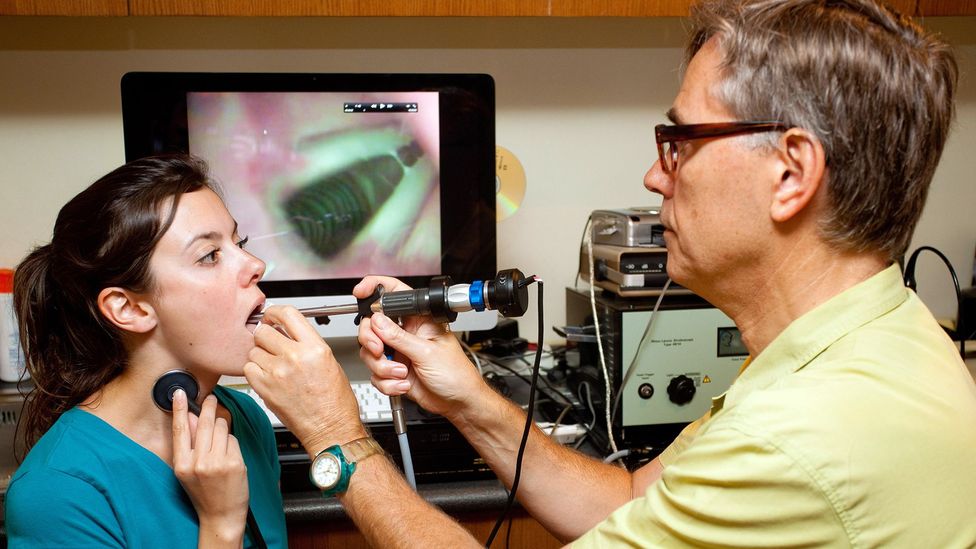I’m listening to the director of my London choir demonstrate a singing scale, starting with a low humming noise before opening his mouth fully to produce a resonant “aah” sound. As the choir joins in to warm up our voices, I imagine my vocal cords vibrating up to 2,000 times per second, deep within my larynx.
After suffering from flu and losing my voice completely over Christmas, I was hesitant about attending my first choir rehearsal. It is accepted wisdom in many circles, that if you are suffering from a cold, it’s best not to sing at all. But how true is this? How does singing with a cold impact your voice? And how do you help your voice heal if it’s recovering from illness?
If you have a nasal cold which is affecting your sinuses or an upper throat infection, you are usually fine to keep singing, says Declan Costello, a consultant laryngologist who specialises in treating voice disorders at Wexham Park Hospital, in Slough in the UK.
“I saw a singer a few months ago who had bacterial tonsillitis,” he says. “He was feeling rubbish and had big white spots at the back of his throat, but his voice was actually working fine as it was the upper part of his throat that was affected. He ended up singing a huge solo at the [BBC] Proms.”
Blocked sinuses or a sore throat are also unlikely to affect your singing ability, says Costello. “If you’ve got a stuffed-up nose, it might feel very different to the singer, but it tends to not make a huge amount of difference to the audience’s perception of the voice.” If you’re not a professional performer, however, you might want to skip your choir rehearsal to avoid spreading the virus to fellow singers. (Learn more about how diseases can spread when you sing.)
Common viral infections, such as a cold or flu, can sometimes lead to a condition known as laryngitis – inflammation of the voice box, which causes swollen vocal folds (or vocal cords). Symptoms include hoarseness, a sore throat and an irritating cough.
Singers are generally advised to rest their voice and avoid performing when suffering from this. “If the vocal cords are inflamed, you want to try to avoid too much in the way of vocal exertion,” says Costello.

Common viral infections that cause cold and flu can lead to inflammation of the voice box, which can require rest to avoid damaging them further (Credit: Alamy)
Among the warning signs indicating that you might have laryngitis are primarily vocal fatigue and if it takes a lot of effort to sing, or speak, says Deirde Michael, assistant professor in the department of otolaryngology at the University of Minnesota Medical School, who helps return injured singers to the stage. She stresses laryngitis isn’t always painful and that singers shouldn’t wait for pain or discomfort to set in before choosing to rest their voice.
Unlike other muscles, the vocal folds don’t have pain receptors, explains Stephanie Misono, head of laryngology and director of the voice clinic at the University of Minnesota medical school. “For that reason pain is often a later sign [of laryngitis], which follows effort and fatigue,” she says. Often the first sign your vocal cords might be struggling is when your voice feels hoarse. Professional opera singers, for example, report struggling to control note in the middle and lower regions of their vocal range when their vocal chords became fatigued.
You might also want to read:
- How living in a cold home affects your health
- The covert winter wave of Covid-19
- Why some childhood illnesses are spiking
Singing while suffering from laryngitis can as a result cause long-term damage to your voice and, in some cases, serious medical problems. Professional singers are most at risk, but it is probably something for even casual singers to avoid.
“If you are pushing through to reach those high notes [while suffering from laryngitis], your muscles are working so much harder than they’re supposed to or in a much more imbalanced way,” says Michael. “What happens then is that the vocal technique can start to morph, in the same way that somebody who sprains their ankle and is limping for a long time, can actually [start to see] long-term consequences in their gait. Six months [after spraining their ankle], the opposite hip is having a problem,” says Michael. “Pushing your way through a cold can have pretty bad, long-term consequences that are hard to undo.”
With laryngitis, it is often better to simply rest your voice until your condition improves.
“If it’s really taking a heroic amount of effort to power through something, that might be the time to take a step back and explore other options, whether it’s changing amplification, transposing [the tune] to a different key or maybe taking a pause from singing,” says Misono.
Keeping coughing and throat clearing to a minimum can also make recovery quicker. “Every time you do that, you’re bashing the vocal cords together, which makes them more and more inflamed,” says Costello. “When your vocal folds are inflamed and red and angry, it’s going to cause [voice] problems.”
It’s also important to drink a lot of water to keep the voice hydrated and to avoid using decongestants which have a drying effect on the throat, adds Michael.
In some rare instances, however, surgery may be needed. “Most of the time people do OK, thankfully, but the times that they don’t, the price can be quite high,” says Misono.
For example, severe inflammation of the vocal folds can sometimes also lead to a haemorrhaging, which is when the delicate blood vessels burst open and results in a bruise developing along the fold, says Costello.
In some cases, singers who have overused their voice will develop a polyp, a fluid filled lesion, on their vocal fold that needs to be surgically removed, he adds. “So in the worst case, if you sing when you’re hoarse and if you’re forcing a sore throat, you could develop problems that then require an operation to unpick them,” says Costello.
British singer-songwriter Adele had to have vocal fold microsurgery to stop the bleeding from a benign polyp, which forced her to cancel tour dates in 2011.

Adele underwent surgery on her vocal folds in 2011 after complaining of a chest infection (Credit: Gareth Cattermole/Getty Images)
Vocal fold nodules are another concern for many singers, but they aren’t caused by colds or infections, according to Costello.
“Nodules develop over time when a singer brings their vocal folds together with a lot of energy. If you’ve got quite a loud voice, then you can end up with thickening calluses on your vocal folds. These nodular swellings can get bigger and bigger over time and cause hoarseness,” he says. “The solution for nodules isn’t surgery, but to use the voice in a less energetic and loud way.”
The Covid-19 pandemic, however, has brought some fresh concerns for those who make a living from their voice. Singers who have suffered from Covid-19 have reported longer-term changes in their singing voice due to breathing problems, or problems with their vocal cords. While perhaps such changes in vocal ability might not have much impact on the average person, they are worrying for professional singers.
It is “having a substantial impact on their breathing and [leading to] a fairly high frequency of persistent coughing,” says Misono. “It is not directly affecting the larynx or the vocal folds necessarily, but it is having an effect on breathing… if a singer’s breathing is compromised, it’s very difficult for them to do everything they would like to do with their voice,” she says.
Shortness of breath is a common symptom of long Covid, for example, and some recent variants of the virus such as Omicron have also been found to cause problems in the upper respiratory tract around the larynx. Besides respiratory problems, Covid-19 is also causing fatigue and malaise among singers, which is making it more difficult for them to feel “energised and vibrant” when performing, she says.
Whether Covid-19 will have lasting effects on the singing voices of those who catch it is much less clear.
But for those struggling against the winter infections doing the rounds this year, it is perhaps reassuring to know that the music doesn’t have to be completely absent from their lives.
Singers who have been told to let their voice recover after illness may wish to keep doing “little vocalisations” a few times a day to slowly build up to singing again. “We don’t advocate total vocal rest,” says Michael.
—
Join one million Future fans by liking us on Facebook, or follow us on Twitter or Instagram.
If you liked this story, sign up for the weekly bbc.com features newsletter, called “The Essential List” – a handpicked selection of stories from BBC Future, Culture, Worklife, Travel and Reel delivered to your inbox every Friday.
Published on The Perfect Enemy at https://bit.ly/3Rloi6W.
Comments
Post a Comment
Comments are moderated.